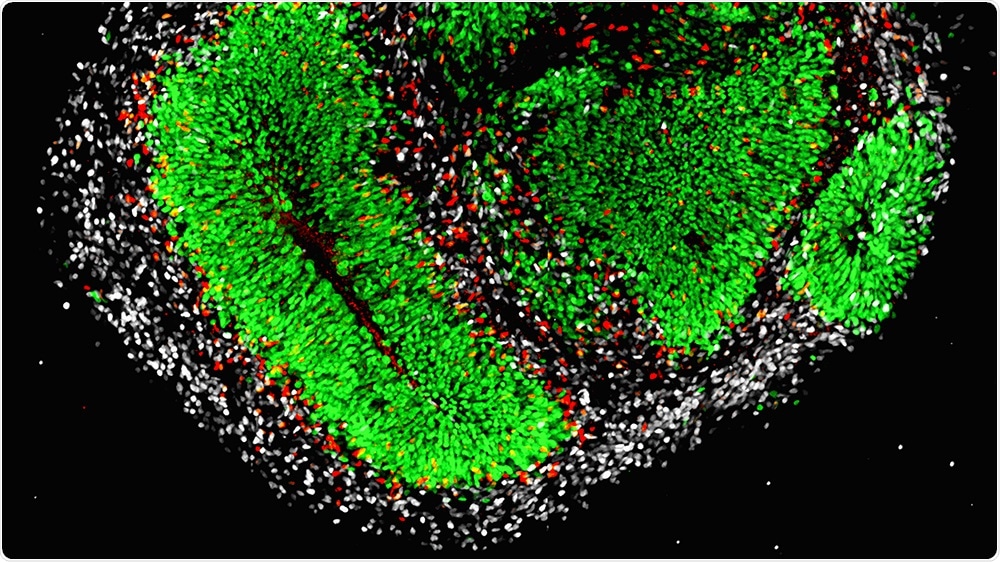Neural stem cells play a major role in the early development of the brain and they also continue to remain active throughout the lifetime.
They undergo cell division, constantly produce new nerve cells, and allow the brain to continuously adapt to new requirements.

Cerebral organoids produced by human embryonic stem cells are organ-like cell cultures of the brain. Image Credit: Daniel Gonzalez-Bohorquez, UZH.
Various genetic mutations obstruct the activity of neural stem cells, thus leading to learning and memory deficits in the affected people. To date, not much is known about the mechanisms that are responsible for these outcomes.
Enzyme regulates brain stem cell activity
For the first time, an international team of researchers, headed by Sebastian Jessberger, a professor at the Brain Research Institute at the University of Zurich (UZH), has demonstrated that the lifelong activity of the brain stem cells is regulated by a lipid metabolism enzyme. The study was published in the Cell Stem Cell journal.
Called fatty acid synthase (FASN), this enzyme plays a key role in the formation of fatty acids. A particular mutation in the genetic information of the enzyme causes cognitive deficits in the affected patients.
The researchers, who were led by postdoc Megan Bowers and Ph.D. candidates, Tong Liang and Daniel Gonzalez-Bohorquez, investigated the FASN’s genetic change in the mouse model and also in the human cerebral organoids, which are organ-like cell cultures of the brain developed from the human embryonic stem cells.
“This approach allows us to analyze the effects of the defective enzyme in the brains of adult mice and during early human brain development in parallel,”Jessberger explained.
In this study, the genetic data of both the human and mice organoids were experimentally altered so that the lipid metabolism enzyme displayed the precise mutation that had been detected in individuals with cognitive deficits.
Diminished stem cell activity reduces cognitive performance
The FASN mutation reduced the division of stem cells which continuously produced new nerve cells, in mice as well as in human tissues. This is caused by the hyperactivity of the mutated enzyme because fats build up within the cell, subjecting the stem cells to stress and decreasing their potential to divide.
Due to the mutation, the mice also displayed learning and memory deficits similar to the cognitive deficits found in the affected people.
Our results provide evidence of the functional correlation between lipid metabolism, stem cell activity and cognitive performance.”
Sebastian Jessberger, Professor, Brain Research Institute, University of Zurich
The newly identified mechanism reveals how the neuronal stem cell activity is regulated by lipid metabolism and thus affects brain development.
The new discoveries regarding learning and memory deficits in people were only made possible by linking our research on animal models and in human cells.”
Sebastian Jessberger, Professor, Brain Research Institute, University of Zurich
According to the researchers, their new methodology offers a blueprint for performing a comprehensive study on the activity of stem cells located in the brain and their contribution to cognitive processes to achieve a deeper insight into poorly understood diseases.
Stem cells as a therapeutic objective for brain diseases
In addition, we hope that it will be possible to control stem cell activity therapeutically to use them for brain repair—for example for the future treatment of cognitive disorders or in association with diseases that involve the death of nerve cells, such as Parkinson's disease or Alzheimer's disease.”
Sebastian Jessberger, Professor, Brain Research Institute, University of Zurich
Source:
Journal reference:
Bowers, M., et al. (2020) FASN-Dependent Lipid Metabolism Links Neurogenic Stem/Progenitor Cell Activity to Learning and Memory Deficits. Cell Stem Cell. doi.org/10.1016/j.stem.2020.04.002.